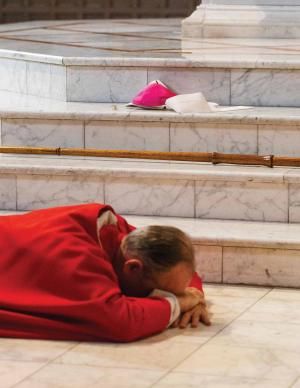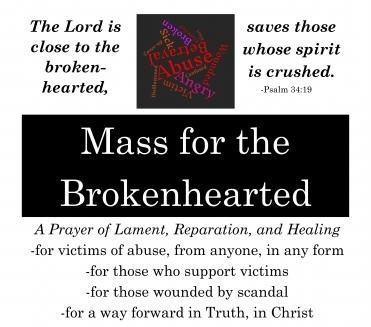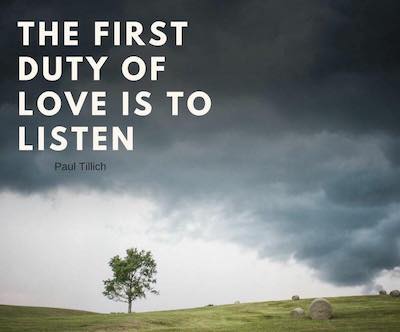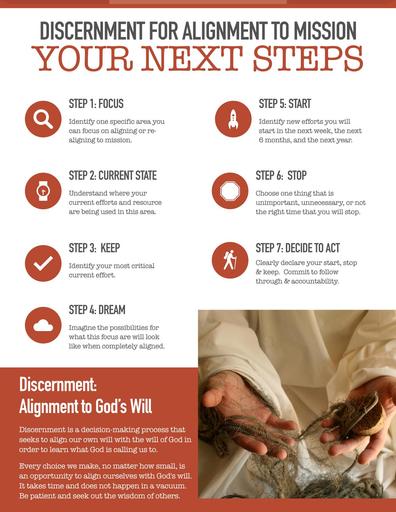What does accompaniment look like in the midst of the current crisis of abuse, cover up & scandal? It must mean first LISTENING.

Person to Person Listening: Openness of Heart
We need to provide a space within our hearts for others to feel their despair, hopelessness, anger, betrayal, fear, denial and heartbreak - and then to simply sit with them in that place.
I am struck by how often we (all the Baptized) fall into the trap of trying to tell other people what to feel and how to think about all these matters. What starts as sharing my own emotions quickly turns into debating, posturing, defending, and becoming solution-focused.
When I jump to responding, I ignore the lived experience of the person in front of me. I focus on myself - my own defensiveness, skepticism, anger, etc - rather than being truly present to the other. When I jump to solutions, I am not truly present to brokenness.
We have a particular responsiblity to listen and be truly present to those who have been hurt, traumatized and destroyed by men acting in the name of the Church. It is especially important that we do not allow them to feel forgotten as the spin, politics, and finger pointing continue to make news.
We must pray for those who are still hurting while we argue - but genuine accompaniment calls us to more than prayer. It calls us to compassion, to empathy - to listening - rather than arguing.
Communal Listening: Masses of Healing, Reparation, Atonement, & Repentence
What might this kind of listening look like the context of a larger community - a parish or a diocese?
 Mass of Atonement for victims of abuse Sept. 14, at the Cathedral of the Sacred Heart in Richmond. (CNS photo/Michael Mickle)
Mass of Atonement for victims of abuse Sept. 14, at the Cathedral of the Sacred Heart in Richmond. (CNS photo/Michael Mickle)
Some communities are responding with Masses specifically reaching out to those affected by the scandal in any way. These are often called Masses of Reparation or Masses of Atonement.
Since Holy Mass is the representation of Christ's infinitely perfect Sacrifice of Calvary, it is one of the best means of offering satisfaction or reparation for our own sins or the sins of others. In fact, St. Therese of Lisieux said the best reparations she could ever make for sin was attending Holy Mass and worthily receiving Holy Communion.
Masses of healing, reparation, and atonement can help people connect to and encounter God through the Mass during this time of suffering, anxiety, and confusion.
As a demonstration of listening and a desire to foster "genuine spiritual encounter," some Bishops are visibly expressing contrition to those who have been impacted by abuse. Bishop Barry C. Knestout of Richmond, Va, lay prostrate during the Mass of Atonemnent for victims of abuse after having removed the symbols of his office - his ring, miter, crosier and zucchetto.
"I am sorry for those who have suffered abuse. I am sorry to your families, who have had to carry that with you," he said during the Mass. "I am sorry to this Church of Richmond, the people of God who see the Church torn apart, that we failed so miserably and are shamed before the whole world because we were called to so much more, but we fell short, so far short, of what we should have done." Read the full article.
Mass for the Brokenhearted
One parish - St. Gabriel the Archangel in Neenah, WI - has recognized how even the language we use can better reflect a posture of listening. They are avoiding insider or "churchy" language by referring to their Mass as a "Mass for the Brokenhearted."
The publication materials for the event read:

In the storm of scandal and the revelations of the worst of our humanity, we come face-to-face with what Jesus has always known. God entered into the ugliest parts of our shattered world and showed us a path to life and light. Like Jesus, pierced in the side, we are brokenhearted. We cry out in shame at our own failures, in anger and frustration and disbelief at man’s inhumanity, in anguish for innocent victims, and for believers caught up in the distress and distrust.
Our faith tells us that the Lord is here, offering a reassuring hand from the other side of brokenness and suffering and death. At times like this, our eyes stinging with tears, His face may be hard to discern. But we do know that there is goodness and truth and beauty that will continue to be revealed in His light. He is the One on Whom our hope is founded, the One to Whom we go for refuge.
We hope you find in this gathering a measure of the healing that we all seek. Scripture and music and prayers have been chosen to help articulate our sorrows and point our way forward together. May the words, melodies, silences, and gestures minister to all of us. While this is only one step in a lifelong journey, may we re-commit ourselves to supporting one another as the Body of Christ, wounded and yet redeemed.
pdf View the Worship Aid for The Mass for the Brokenhearted pdf
Responding as Church: Listening Sessions
Other parishes and dioceses are hosting listening sessions to help give people the opportunity to be heard by representatives of the Church. These listening session are often fraught with high emotions and it is essential for anyone hosting a listening session to lay out the expectations at the beginning and to avoid getting defensive or frustrated at those who attend and share their thoughts.
Some listening sessions have very few ground rules - asking only for those attending to remain respectful of one another.
Participants at St. Edward's listening sessions could say anything they wished, but they also were given four questions to reflect on: "What are you feeling? How does the current situation impact your identity as a Catholic? What would you like to say to the hierarchy (national or local) and what do you need to hear them say/see them do? What can we as leadership in the parish assure that we're doing best we can to make this a safe environment?" Read the full article.
Others have a more systematic process for sharing - reminding people that a listening session is not the same thing as a discussion. One woman shared with me a listening session she had been to that was fruitful, allowed everyone to be heard, and collected valuable feedback for their Bishop:
We started by going around the room simply saying how we were feeling. The presenter kept us on task (just focused on feelings). No one was allowed to immediately comment on another person's thoughts.
The second round was to say what we had heard each other say. The third round was to give insights into what might be 2-3 root causes of abuse/crisis in the Catholic church.
The fourth round was focused on each of us sharing 2-3 important things we wanted church leadership to know. The facilitator encouraged us to be specific and direct: "I want the USCCB leadership to know..." "I want my parish priest to know..." "I want the laity to know…"
The fifth round asked us each to complete the sentence "All of this tells me…." The last round was about gratitude: "I am grateful I was a part of this conversation because.." or "One gift I received was..."
During the conversation, the presenter continually checked in making sure he was hearing us correctly. He then compiled his notes (no names were given), and emailed them to the Bishop, who emailed him back thanking him. This was an important part for me - I feel like if you are collecting people's insights, you have to do something with them.
I really think that this process can help a lot of people. I was thankful it wasn't a back and forth discussion. I could voice my thoughts to people who were listening and I could hear that I wasn't alone in my pain.
One key element to the fruitfulness of these listening sessions seems to be a sensitivity to the variety of emotional, intellecutal and spiritual responses people may have. Some people come desiring to "be heard" and want to speak up about their experiences and their feelings. Others want to know that - if the Bishop is not present - their thoughts and concerns will be shared with him. Some simply want to come and be present - and may not be comfortable speaking up. Those who have been abused by clergy often want prayer to surround the listening sessions, but do not want a member of the clergy to lead the prayer.
Some things to consider if you are planning a listening session:
- What will the ground rules of the experience be? What is the format?
- What is the goal of the session? Consider providing reflection questions that help guide the discussion / sharing time.
- Will the Bishop be present? If not, who will be responsible for taking notes and delivering those to the Bishop?
- What is the role of lay men, lay women, religious, and deacons? It seems that having a lay person lead prayer has been fruitful. Some people have indicated that they wish lay women and women religious would have had a more visible role in the listening session.
- How will those who are more introverted or who are not comfortable speaking their thoughts aloud be heard? One set of listening sessions offered attendees the opportunity to express their feelings and thoughts for Bishop on notecards that were collected and given to him.
- Is there an intercessory prayer team or healing ministry that can be present? Consider offering more personal healing prayer opportunities with gifted prayer team members after the session is completed. Keep prayer teams visible in a large, public space.
- What follow-up accompaniment will you be offering for people after the session?
How can you better accompany those who are hurting because of this crisis?
What does listening look like for you right now?
How is your larger community (parish / diocese) responding?
Loving Father, bring healing to your people. Help us to pick up the pieces. Help us to be the face of your love.
If you have ever experienced sexual abuse by a member, leader, or representative of the church, I am so very sorry. Please report it to the civil authorities. If you do not want to do that alone, please find someone you trust to go with you. If you don’t have anyone, please let us know and we would be happy to help.
If you had sexual contact with a clergy member as an adult - you are a survivor of horrific abuse. Some states have statutes that offer you legal recourse - even if it was consensual. Please reach out if you need help finding healing and justice.


